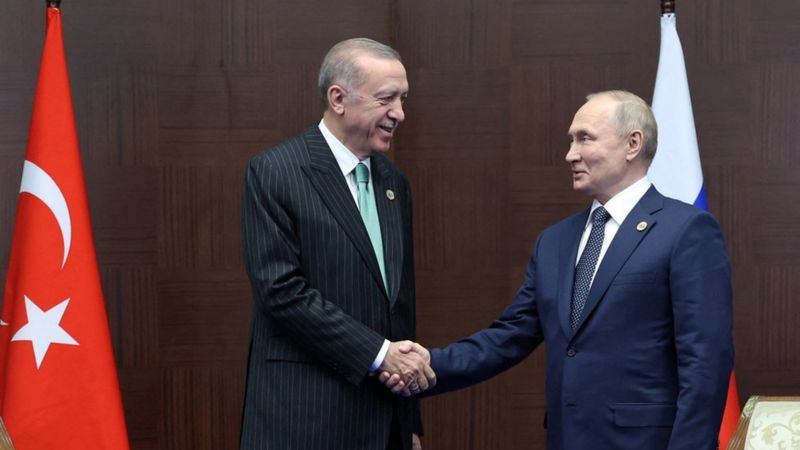Vladimir Putin, the president of Russia, broke the mould first.
He didn’t even wait for the official election results before pointing to Mr. Erdogan’s “independent foreign policy” as the cause of his win because he was so eager to soothe the ego of his Turkish counterpart and fellow “strongman” leader.
We can reasonably infer that Mr. Erdogan’s failure to distance himself from the Kremlin following its full-scale invasion of Ukraine, even while Turkey’s partners in Nato applied sanctions and reduced their reliance on Russia for energy, is the Turkish approach that Russia is particularly fond of.
Since the commencement of the war in Ukraine, trade between Turkey and Russia has even greatly expanded.
But US President Joe Biden followed Mr. Putin’s congratulations on Sunday closely.
Turkey participates in all of NATO’s military activities and is a crucial member of the alliance.
Erdogan may have tight links to Russia, but he also gives Ukraine military assistance.
He is credited with brokering an agreement whereby Russia lifted a ban on food shipments coming from Ukraine, allowing them to reach regions of the world that depend on them. He also officially approved Finland’s enlargement into NATO after much deliberation.
Formerly a fervent supporter of Turkey’s EU membership, Mr. Erdogan now talks about “making Turkey great again.”
He has had to pursue a more independent foreign policy as a result. He has grown extremely transactional connections with all of his allies over the years.
Sweden would give the alliance crucial protection against Russia in the Baltic Sea.
The West expects that the catastrophic situation of Turkey’s economy, along with the possibility that Mr. Erdogan will have to focus on bringing in foreign investment and stabilising finances, will prove to be a soft spot to press for Sweden’s Nato membership as a trade-off.
The only NATO nations still opposing Stockholm’s membership are Turkey and Hungary.
While waiting for President Erdogan to provide assurances, President Macron is concerned about immigration to the EU.
More over a million refugees and asylum seekers, mostly from Syria, travelled on smugglers’ boats across the Mediterranean to the EU during the 2015 migration crisis.
Every political party contesting in Turkey’s parliamentary elections made a commitment to act to address “the migrant issue” this month.
The EU is concerned that Turkey may push refugees back into Syria, endangering their safety, and that it may once more give people smugglers carte blanche to launch boats carrying migrants and asylum seekers across the Mediterranean.
Brussels is also on guard as EU member Cyprus is still on edge following Mr Erdogan’s call for a two-state solution (Greek and Turkish) to decades-long divisions there following a Turkish invasion nearly 50 years ago. EU member Greece is also on the defensive as it is embroiled in a number of disputes with Mr Erdogan focused on the Aegean Sea.
The West once referred to Turkey as the link connecting Europe and the Middle East, but since Russia invaded Ukraine, Turkey’s standing has changed.
As he enters his third decade in office, few anticipate Mr. Erdogan to make significant foreign policy surprises. However, Ankara’s key partners are keeping a very close eye on things.















